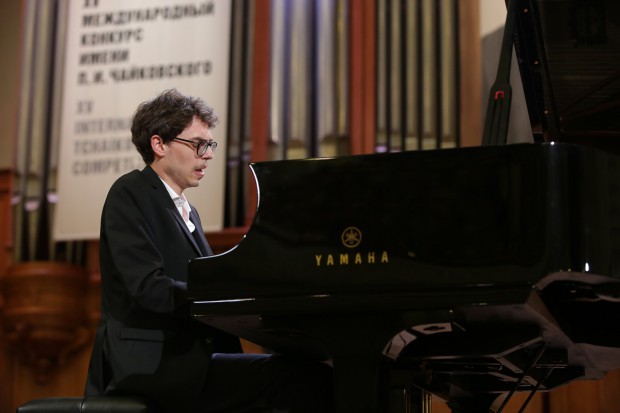Vladimir Putin was sitting a few rows in front of me last Thursday evening in Moscow listening patiently to three hours of classical music without interval. I could not imagine David Cameron or HMQ doing the same – Britain’s Got Talent is more their cup of tea.
But then classical music is as much a part of Russian politics as its attitude to neighbours and this was the winners’ gala of the monumental four-yearly Tchaikovsky music competition, which never ceases to be a political event. That was why I went, after all – to see how today’s politics would play on the choice of top prizes, whether Russia would sweep everything, given present geopolitical sabre-rattling and this being Tchaikovsky’s 175th anniversary.
Well, well, this year’s competition proved an utter astonishment. The 15th edition will be legendary, just as Van Cliburn’s victory in the first edition in 1958 is legendary. In a country where ‘the Russian pianist’ is expected to personify world-beating capacity in everything from mighty technique to exquisite fantasy, and where it goes without saying that you start training very very young, the entire orthodoxy of piano training was upended by the emergence of a self-taught Frenchman.
Lucas Debargue, a 24-year-old with specs, an unenthusiastic moustache and a tendency to culotter, who mostly plays in jazz clubs and learns vast Russian piano pieces by ear from other people’s recordings, captivated all with his individual, gossamer musicianship and ended up in the final. He was even invited by Gergiev to play in front of Putin. This really isn’t done – it’s never been done.
But Debargue is a one-off, a miracle, a phenomenon. He started playing a friend’s piano by ear, aged 11, and tinkered around until giving up at 17 and working in a Paris supermarket, while desultorily taking a literature degree. Invited by his old home town to play in their local festival, he picked up the piano again and played so brilliantly that he was put in touch with a hot-house Russian piano coach in Paris. After four years working with her, he was in the final of the Tchaikovsky competition, playing with an orchestra for the first time in his life.
I met him for a long interview. He’s not autistic – he’s just crazy about music, obsessive about detail and nuance, and in teaching himself the piano has, as he admitted, lost all his friends in France entirely. He still has no piano. He reeled off the pieces he’d learned by ear: including Prokofiev and Scriabin sonatas and Rachmaninov’s second concerto. Could he play them accurately?, I asked. He said, the essentials are there. I said, your English is jolly good. He said, he learned it by reading Joyce’s Ulysses.
He told me that as a lonely teenager he’d identified with David Helfgott. A super-rational French journalist covering the competition said she found him borderline weird, but I think she is just super-rational. After all, he has been working alone and unloved in France for four years with his teacher, and suddenly he was being mobbed by reporters and TV crews, approached by mentors and agents, and besieged by girls. He is, behind the terrible tash, rather dishy actually.
The story defies belief. But should it? Debargue’s peculiar circumstances were noted a year ago when he won a French competition and was found afterwards playing in jazz bars. He told me that he was quite happy playing jazz eight hours a day to earn the money for his classical studies. His finger technique, honed in jazz, is so odd, so individual, that an eminent Russian piano teacher actually walked out of his Tchaikovsky concerto playing (you can hear his performances here) in the final, saying loudly she could not endure to hear the piece being played by someone who had evidently not been properly trained.
And that was the nub of it: what is ‘proper training’? Had the mighty Tchaikovsky competition thrown up a spectacular test of nature v nurture?
I met the epitome of ‘proper’ Russian piano training, 16-year-old prodigy Daniel Kharitonov, another finalist, who’s studied systematically since he was five. A happy, balanced teenager, he clipped off about 20 per cent of the usual time needed to play the ferocious Tchaikovsky and Liszt first concertos, and said afterwards that none of it was difficult to play. He was placed third, one above Debargue.
So it was fascinating to discover more about the judges’ verdicts later. You’d expect them, wouldn’t you, to have preferred the perfect Russian product Kharitonov above the unschooled maverick. Not a bit of it. Two Russian pianists on the panel, Dmitri Bashkirov and Boris Berezovsky, have said Debargue is a wonder, for all his flaws, and should have been higher in the prizes. They said it was the non-Russians on the panel – which included Peter Donohoe, Barry Douglas, Michel Beroff and Klaus Hellwig – who had placed Debargue last.
One thing is certain: to have won would have destroyed Lucas Debargue, who has as yet nothing like the dependability, self-confidence or repertoire to handle the workload that follows victory. To lose has been far, far more valuable. Two years more of solid work, said Bashkirov, and Debargue could become one of the greatest of all. Mark his name, and cross your fingers that this magician does not simply become eccentric.






Comments